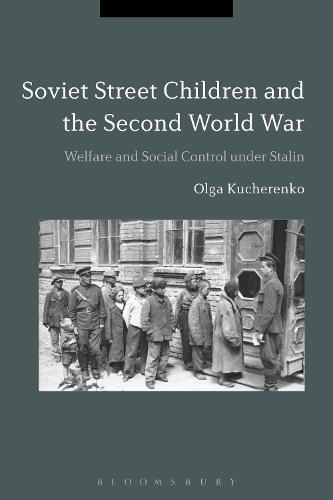
Soviet Street Children and the Second World War: Welfare and Social Control under Stalin
(Paperback)
Available Formats
Publishing Details
Soviet Street Children and the Second World War: Welfare and Social Control under Stalin
By (Author) Dr Olga Kucherenko
Bloomsbury Publishing PLC
Bloomsbury Academic
25th January 2018
United Kingdom
Classifications
Tertiary Education
Non Fiction
Social and cultural history
Child welfare and youth services
European history
History and Archaeology
362.7094709044
Physical Properties
Paperback
256
Width 154mm, Height 232mm, Spine 18mm
400g
Description
A time of great hardship, the Second World War became a consequential episode in the history of Soviet childhood policies. The growing social problem of juvenile homelessness and delinquency alerted the government to the need for a comprehensive child protection programme. Nevertheless, by prioritizing public order over welfare, the Stalinist state created conditions that only exacerbated the situation, transforming an existing problem into a nation-wide crisis. In this comprehensive account based on exhaustive archival research, Olga Kucherenko investigates the plight of more than a million street children and the states role in the reinforcement of their ranks. By looking at wartime dislocation, Soviet child welfare policies, juvenile justice and the shadow world both within and without the Gulag, Soviet Street Children and the Second World War challenges several of the most pervasive myths about the Soviet Union at war. It is, therefore, as much an investigation of children on the margins of Soviet society as it is a study of the impact of war and state policies on society itself.
Reviews
This volume contributes to four subjects in Soviet history: the history of the home front during World War II, childhood, social welfare policies and institutions, and childrens colonies and labor in the Gulag. Anyone teaching or pursuing research on these topics will find valuable information to enrich lectures or explain the institutions encountered in other research materials [The] text is also accessible to advanced undergraduate students. * Journal of Modern History *
Uncovering the stories of wartime street children, Kucherenko makes a significant contribution to the history of childhood. The book also constitutes a provocative intervention in debates on the nature of Stalinism. Kucherenko not only challenges the heroic narrative of exemplary Soviet care for children; she argues that Soviet officials indifferent to childrens suffering and partial to repression as a means of social control deserve much of the blame for producing, brutalizing, and then forgetting millions of homeless and abandoned children. * Journal of the History of Childhood and Youth *
This detailed and well-researched book is a welcome addition to the literature on homeless children in the Soviet era. With its extensive documentation, glossary, and bibliography, Kucherenkos work is useful both to scholars and to the lay reader. * The Russian Review *
[Kucherenko's] exhaustive arguments, understanding of the period, and well researched text underlines the quality of her work and its successful additional to the existing literature. * European History Quarterly *
Kucherenkos rigorously researched work makes an important contribution to the historiography of the Great Patriotic War and is useful to historians of childhood across other international contexts and chronologies. * The English Historical Review *
Kucherenko offers a well-researched and well-written addition to the histories of the Second World War With rich source material, it provides fascinating case studies and excellent analyses, which help to unearth what the Soviet leadership had meant to bury. * Jahrbcher fr Geschichte Osteuropas *
Kucherenkos first monograph Little Soldiers: How Soviet Children Went to War, 1941-1945 established her as one of the foremost social historians of the Great Patriotic War. Her new work addresses the fate of Soviet displaced children behind the lines. It is similarly grounded in extensive and meticulous original research and written with the same analytical clarity, fluency of exposition and moral sensitivity. This book represents an important new contribution to our understanding of Stalinist state-society relations and population policy during wartime as well as to the history of twentieth century childhood and youth. * Nick Baron, Associate Professor in History, University of Nottingham, UK *
This excellent work is a much-needed addition to the narrative of the Great Patriotic War, filling a gaping hole in the scholarship and in the public memory of the war. Kucherenko provides a meticulously-researched, nuanced exploration of the plight of wartime street children, the conditions which put them there, and the complex of state institutions, provincial authorities, local officials, professionals, and volunteers tasked to deal with them. Moving skillfully between orphanage and trade school, juvenile court and holding cell, labor colony and train car, she reveals the world of children caught between a horrific war and a state system that could not help them. * Julie deGraffenried, Associate Professor of Russian and East European History, Baylor University, USA *
Soviet Street Children and the Second World War convincingly challenges Soviet image makers and subsequent historians who have asserted that throughout the war the Soviet state had childrens best interest in mind. Instead, we find a regime that actively criminalized behaviors and institutionalized children to an unprecedented degree. Controlling the population became more important than protecting children, and new wartime policies exacerbated vagrancy and deviance while further marginalizing many children. Olga Kucherenkos engaging writing and meticulous research illuminates a poorly understood aspect of Soviet childrens lives during World War II and provides a much needed corrective to the historical record. * Karl Qualls, Professor of History, Dickinson College, USA *
The study is argumentative but scholarly, including 69 pages of supporting materials. * CHOICE *
Author Bio
Olga Kucherenko is the author of Little Soldiers: How Soviet Children Went to War, 1941-45 (2011). She is currently working on a new project, investigating Anglo-Soviet relations in the 1940s.
